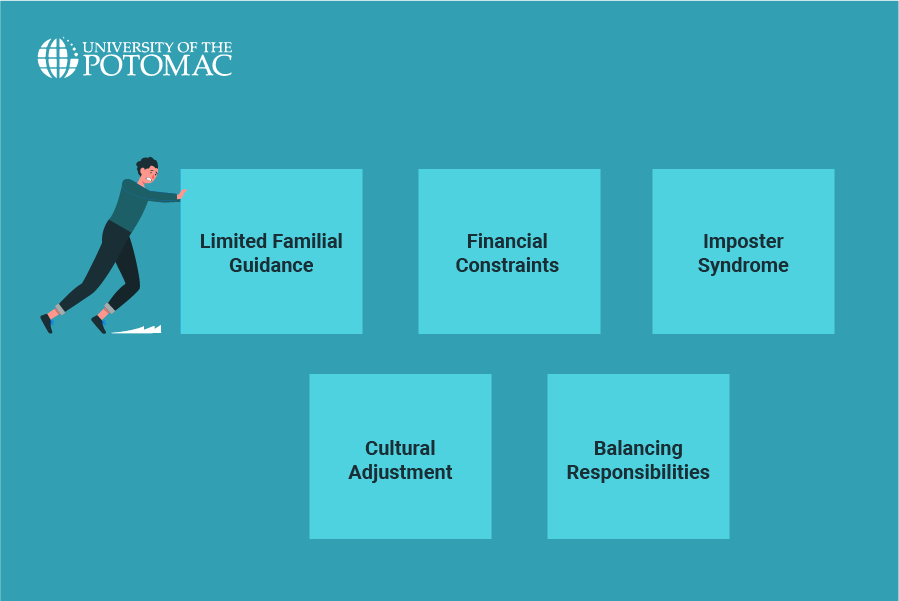As the term implies, a first-generation college student is the first member of their family to attend college. While this accomplishment represents a moment of triumph, being a first-generation college student comes with a set of unique challenges. These students pioneer new paths into higher education and break familial traditions to broaden their perspectives and uncover their potential for societal impact.
This comprehensive guide delves into the experiences, triumphs, and challenges that first-generation college students face. Recognizing the resources and tools at their disposal will cultivate a sense of community and support, further emphasizing the strength, resilience, and growing potential that first-generation students bring to academic settings.
Understanding Who Is a First-Generation College Student

While, in theory, a first-generation college student is considered one whose parents did not complete a 4-year college degree, this definition can vary depending on the institution.
In some educational institutions, you are considered first-gen only if your parents didn’t attend college at all. Some others take a broader approach, asserting that any student who self-identifies as lacking prior knowledge or exposure to navigating higher education qualifies as first-gen and may need additional resources.
First-generation college students experience college differently from their non-first-gen peers. The latter can benefit immensely from the experiences and academic insights of their parents who completed college education before them. They have a support system within their families, guiding them toward making informed decisions when attending college.
On the other hand, the lack of various factors, including family background, support systems, and familiarity with the higher education environment, can impact first-generation college students because they aren’t exposed to the concept of college education and what to consider before entering this unfamiliar territory.
The College Application Process for First-Generation Students
Approaching the college application and preparing for college as a first-generation student can be a daunting task; nevertheless, early preparation is crucial. Begin thinking about college during your early high school years and explore your interests and potential career paths.
Attending college fairs and researching colleges that support first-generation students are equally important. Familiarize yourself with financial aid options, including Federal financial aid (FAFSA) and other forms specific to certain colleges.
Another vital component of your college application process is the essay and, potentially, the interview. The essay serves as your personal statement, allowing you to showcase your unique perspective and experience. Remember to be authentic and share your personal story!
It is important to develop a strong sense of self for interviews. This is your moment to articulate your passion for attending that specific college, so be mindful of practicing common questions and familiarize yourself with the college’s programs, culture, and values before the interview.
Benefits of Being a First-Generation College Student
Colleges often maintain a friendly and supportive approach toward first-generation college students, acknowledging the challenges they encounter and emphasizing the need to provide additional resources.
Besides academic and social campus support, some college institutions offer financial aid by waiving the standardized application fee for first-generation college students while also prioritizing them for scholarships. Such advantages lift some weight from students’ shoulders and their families, which helps them thrive.
Additional benefits and positive attributes associated with being a first-generation college student include:
• Bringing a unique perspective to campus
• Being driven by a strong sense of motivation and determination
• Cultivating a strong work ethic from an early age
• Enhancing their potential to make a positive impact on the community
• Having a profound appreciation for the value of education
Challenges Faced by First-Generation College Students
First-generation college students struggle with a unique set of academic, social, and financial challenges, which can impact their educational journey and career prospects.

Limited Familial Guidance: First-generation college students have limited exposure to higher education environments. This results in limited guidance on the college application process, course selection, and career path.
Financial Constraints: First-generation college students often encounter financial challenges, including limited financial resources for tuition, textbooks, and other educational expenses.
Imposter Syndrome: First-generation college students may struggle with imposter syndrome, often feeling a sense of not belonging or incompetence in comparison to their peers who come from families with experience in higher education.
Cultural Adjustment: Adjusting to a competitive environment that college culture encompasses can be challenging for any student, especially for first-generation college students who may not be familiar with the norms and expectations of higher education.
Balancing Responsibilities: Many first-generation students need to balance multiple responsibilities, such as part-time jobs, family obligations, and academic commitments. Finding a balance can be challenging and may impact academic performance.
It’s important to note that these challenges are not all-inclusive. Each first-generation student’s college experience varies in difficulty. However, many colleges offer support specifically designed to assist first-generation students in overcoming these challenges.
Available Resources for First-Generation College Students
First-generation students benefit from many resources that contribute to their personal and academic success. These resources range from on-site resources and programs to external resources and online platforms.
On-campus academic resources aim to address specific student needs and promote a sense of belonging. Some institutions have programs that encompass mentorship opportunities, workshops, and events designed for first-generation students. Tutoring is also provided through academic support centers to help students adapt to the world of academia.
In addition to internal sources, many online platforms are specifically designed to assist first-generation college students. Platforms like First in the Family, Fastweb, and Chegg are all viable resources that provide instructions on the college application process, information on financial aid, advice from current and former first-gen students, study guides, and homework help.
Lastly, community and mentorship play crucial roles in the success of first-generation college students. Building a supportive network both on and off campus fosters a sense of community, enhances the college experience, and provides resources for overcoming challenges. Mentorship can offer valuable guidance and encouragement, helping students navigate academic and career pathways with confidence.
Challenges After Graduation
While graduation marks a significant milestone for students, life after college brings forth numerous challenges. Many first-generation students may grapple with uncertainty, constantly searching for the next thing in their professional path. However, identifying potential challenges in advance can help students in avoiding difficulties.
Interested in pursuing a degree?
Fill out the form and get all admission information you need regarding your chosen program.
This will only take a moment.
Message Received!
Thank you for reaching out to us. We will review your message and get right back to you within 24 hours.
If there is an urgent matter and you need to speak to someone immediately you can call at the following phone number:
- We value your privacy.
College to workforce transition: Entering the labor market as a recent graduate can be a challenging period. Securing a job is a gradual process that calls for unwavering commitment, curiosity, and professionalism.
Remember to leverage college career services for assistance with resume building, interview preparation, and other job search strategies. Keep an open mind toward internships, and utilize these opportunities to gain practical knowledge and skills. Building connections with professionals during internships can increase your chances of securing a job after completing it.
Entering Graduate Programs: Those interested in pursuing graduate studies may encounter unique challenges that complicate their academic journey. These challenges include a competitive application process, additional requirements such as standardized test scores, and increased expenses.
Seek guidance from counselors, mentors, and professors to better understand the process of applying to graduate programs. Explore test preparation resources to succeed in the standardized test. Lastly, explore financial aid options, scholarships, and assistantship opportunities to navigate financial challenges effectively.
Financial Management Post-College: The professional world is unpredictable. Effectively managing finances is crucial for maintaining financial stability after college.
Create a budget to manage living expenses, student loan payments, and savings, as it helps you track spending and ensures that you live within your means. It is essential to refrain from spending uncontrollably, as each expense contributes to your overall financial picture. Establishing an emergency fund for unexpected expenses will help build a safety net, and exploring opportunities for side hustles or part-time work are excellent solutions to supplement your income.
Success Tips for First-Generation College Students
In this section, we will explore a list of tips largely based on information provided throughout the blog. These strategies aim to facilitate smooth progress, pave the way for academic prosperity, and help you succeed in the educational and professional realm as a first-generation college student.
Seek academic support: Take advantage of on-campus resources such as tutoring services, academic advising, and study groups. Feel free to ask questions and seek help when needed.
Utilize available resources: Many universities offer programs specifically designed for first-generation students. These programs may include mentorship opportunities, workshops, and resources tailored to your needs.
Networking: Build connections with professors, classmates, and mentors. A support network can provide guidance, encouragement, and valuable insights into navigating the college experience.
Set realistic goals: Establish short-term and long-term goals for your academic and personal growth. Break down large goals into actionable and achievable tasks to stay motivated.
Engage in extracurricular activities: Take advantage of on-campus workshops and events that focus on academic success, career development, and personal growth. These activities can provide valuable insights and resources.
Conclusion
Being a first-generation college student adds a layer of difficulty to the academic journey. Nevertheless, the strength and potential of first-generation students cannot be underestimated. If you’re a first-generation student yourself, keep in mind that leveraging the tools and resources available can help you overcome obstacles and promote academic success. Don’t waste your potential by doubting yourself. Now is the time to seek continuous learning and support; prepare to make your mark in society!
Frequently Asked Questions
What financial aid options are specifically available for first-generation college students?
Financial aid options available for first-generation college students include FAFSA (Free Application for Federal Student Aid), The Federal Pell Grant, GEAR UP (Gaining Early Awareness and Readiness for Undergraduate Programs), and institutional aid such as scholarships, grants, or work-study opportunities.
How can first-generation college students find mentors or support systems on campus?
To find support systems on campus, first-generation college students should visit the campus career center and student affairs office, participate in student organizations, and attend networking events.
Are there online communities or forums where first-gen students can share experiences and get advice?
Some notable online communities for first-gen students are the FirstGenJourney Forum, First in the Family Forum, Quora, and the FirstGenCollege Forum.
What are some strategies for managing imposter syndrome as a first-generation student?
Managing imposter syndrome involves adopting strategies that promote self-confidence and resilience. It is essential to maintain high emotional intelligence and understand the value of your perspective. Mentors, advisors, or classmates can also provide guidance and reassurance.
Can being a first-generation college student be an advantage when applying for certain jobs or careers?
Yes, being a first-generation college student can be viewed as an advantage in the job market, and it can bring several positive qualities and perspectives that employers value. Those include a unique perspective, resilience and determination, and a strong work ethic, among many others.









